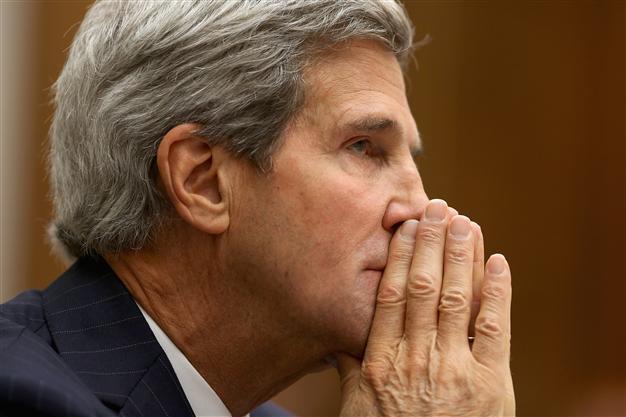Syria crisis: US and Russia embark on diplomatic track
WASHINGTON - Agence France-Presse

U.S. Secretary of State John Kerry testifies before the House Armed Services Committee on Capitol Hill Sept. 10. AFP photo
Syria's chemical arsenal was at the center of a ramped up diplomatic effort Sept. 11 as Washington put its threat of military strikes aside and engaged with Russia's disarmament plan.U.S. Secretary of State John Kerry was to fly to Geneva to discuss the crisis with Russian Foreign Minister Sergei Lavrov on Sept. 12, for talks which officials said could run into Saturday Sept. 14.
Russian news agencies said Moscow had handed a copy of its plan to the United States, but U.S. State Department spokeswoman Jen Psaki said it had "put forward ideas" rather than a "lengthy package." The exchange came the day after US President Barack Obama announced that he would hold off on ordering military strikes in response to the Syrian regime's alleged use of deadly sarin gas against its own people.
Psaki said Kerry's meeting with Lavrov would held Washington gage whether the Russian initiative - a plan to gather and destroy Syria's chemical stockpiles - was a plausible alternative to military action.
"Our goal here is to test the seriousness of this proposal, to talk about the specifics of how this would get done, what are the mechanics of identifying, verifying, securing and ultimately destroying the chemical weapons," she said.
The White House, which had been struggling to win congressional approval for a strike on Syria, has seized on the Russian initiative as a possible new way out of the crisis.
But Washington remains skeptical of the Kremlin's intentions, after it had thwarted past efforts to build international pressure on Assad by vetoing U.S. motions against him. "Russia is now putting its prestige on the line when it comes to moving further along this diplomatic avenue," White House spokesman Jay Carney said.
After the Russian proposal, Syria said it would join an international convention banning chemical weapons and handing over control of its stocks, effectively admitting for the first time it had them.
French President Francois Hollande, the only western ally that has said it would send its own forces to join U.S.-led strikes, warned that the military option was still on the table.
"France will remain in permanent contact with its partners, mobilized to punish the use of chemical weapons by the Syrian regime and to deter them from using them again," Hollande said, after talks with French military chiefs.
China, which has traditionally joined Russia in opposing Western military interventions, called on all sides to "grasp this opportunity to solve the Syria problem through diplomatic and political means."
"Our collective failure to prevent atrocity crimes in Syria of the past two-and-a-half years will remain a heavy burden on the standing of the United Nations and its member states," UN Secretary General Ban Ki-moon said.
With the risk of an attack having receded, al-Assad - who celebrated his 48th birthday on Sept. 11 -- was free to pursue his battle with a rebel coalition that has been left dismayed by the West's retreat from intervention.
Violence in Syria ongoing
The regime carried out an air strike Sept. 11 on a field hospital in the northern province of Aleppo, killing at least 11 people, according to the Britain-based Syrian Observatory for Human Rights.
Elsewhere, Sunni hardliners killed at least 20 civilians in the central province of Homs, with fighters from the Qaeda-linked Al-Nusra Front and another rebel group attacking three Alawite villages, the Observatory said.
Al-Assad, a secular leader who has largely protected the rights of minorities, belongs to the heterodox Alawite sect which Sunni hardliners consider un-Islamic.
Sunni Arab monarchies Qatar and Saudi Arabia have funded the rebels, while Shiite theocracy Iran has staunchly backed Assad.
Obama himself had cited the sectarian nature of the conflict in resisting earlier calls from Britain, France and several U.S. lawmakers to intervene in Syria, where more than 110,000 people have died since an uprising began in 2011.
But Obama called for a limited strike after U.S. intelligence concluded that the regime used sarin gas on August 21 attack on rebel-held suburbs of Damascus, killing more than 1,400 people.
Obama - who had described the use of chemical weapons as a red line - sought to rally a skeptical public in a national address Sept. 11 evening, but also urged a delay in a vote in Congress to make time for diplomacy.
"America is not the world's policeman. Terrible things happen across the globe, and it is beyond our means to right every wrong," said Obama, who rose to prominence as an opponent of the Iraq war.
"But when, with modest effort and risk, we can stop children from being gassed to death, and thereby make our own children safer over the long run, I believe we should act," Obama said.
















